Key Takeaways
- Egocentric behavior often includes traits like self-absorption and lack of empathy, which can harm relationships.
- Recognizing egocentric traits can help you better understand your interactions and improve communication skills.
- While egocentrism can have drawbacks, a healthy ego can boost confidence and motivation.
- Understanding the differences between egocentrism and narcissism is crucial for personal growth.
- Developing empathy and practicing active listening are effective strategies to reduce egocentric behavior.
Egocentric Behavior: Recognizing the Core Traits
When we talk about egocentric behavior, we’re diving into a world where the self often takes precedence over others. This doesn’t necessarily mean that someone is selfish or narcissistic; rather, they may find it challenging to see beyond their own perspective. Let’s explore some of the core traits of egocentric behavior and how they manifest in everyday life.
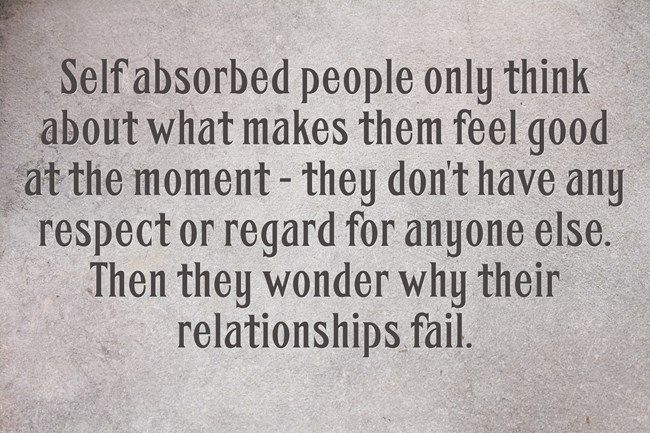
“Self absorbed people only think about …” from www.pinterest.com and used with no modifications.
Self-Absorption and Self-Interest
One of the most evident traits of egocentric behavior is self-absorption. People exhibiting this trait are primarily focused on their own needs and desires. They often struggle to see situations from others’ perspectives, which can lead to misunderstandings and conflicts.
Imagine a conversation where one person continually shifts the topic back to themselves, disregarding the other person’s input. This is a classic example of self-absorption. While everyone occasionally talks about themselves, egocentric individuals do it habitually, often without realizing it.
Sensations of Superiority and Entitlement
Egocentric individuals often carry a sense of superiority or entitlement. They might believe they deserve special treatment or privileges simply because of who they are. This trait can lead to friction in social settings, as others may perceive them as arrogant or condescending.
Challenges in Perspective-Taking
Perspective-taking is the ability to understand a situation from someone else’s viewpoint. For egocentric individuals, this can be a significant challenge. They might struggle to empathize with others or fail to consider how their actions affect those around them.
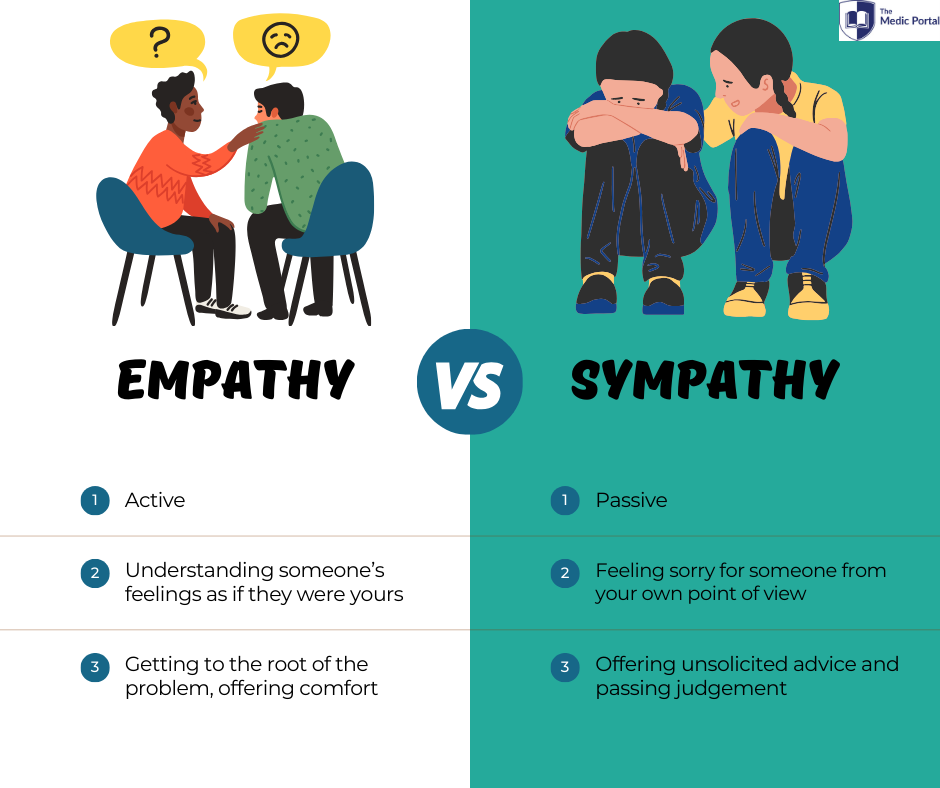
“Empathy vs Sympathy : r/enfj” from www.reddit.com and used with no modifications.
Lack of Empathy
Lack of empathy is another hallmark of egocentric behavior. Empathy involves recognizing and responding to others’ emotions, but egocentric individuals often focus solely on their own feelings. This can make them appear insensitive or uncaring, even if that’s not their intention.
For example, consider someone who dismisses a friend’s distress because it doesn’t align with their own experience. This lack of empathy can strain relationships and create emotional distance.
Communication Difficulties and Interruptions
Egocentric behavior can manifest in communication styles, particularly through frequent interruptions or dominating conversations. These individuals may prioritize expressing their own thoughts over listening to others, leading to one-sided interactions.
Imagine a group discussion where one person continually interrupts, redirecting the focus back to themselves. This can stifle meaningful dialogue and leave others feeling unheard. Understanding how to handle such behavior effectively is crucial for maintaining a healthy communication environment.
Improving communication requires a conscious effort to listen actively and engage with others’ viewpoints. This shift can foster more balanced and respectful interactions.
Positive Aspects of a Healthy Ego
While egocentric behavior can have its drawbacks, it’s important to recognize that a healthy ego also brings several benefits. A well-balanced ego can serve as a powerful tool for personal development and success.
Let’s delve into the positive aspects of maintaining a healthy ego and how it can contribute to your overall well-being. For further insights, you can explore what it means to be egocentric and how it impacts personal growth.
Boosting Self-Confidence
One of the most significant benefits of a healthy ego is its ability to boost self-confidence. When you have a balanced sense of self, you’re more likely to trust in your abilities and make decisions with conviction. This confidence can propel you forward in both personal and professional pursuits.
Consider a situation where you’re faced with a challenging task at work. A healthy ego can provide the assurance you need to tackle the task head-on, knowing that you have the skills to succeed.

“How to Build Self-Confidence and …” from www.choosingwisdom.org and used with no modifications.
Aiding in Personal Motivation
Another advantage of a healthy ego is its role in personal motivation. When you have a strong sense of self, you’re more inclined to set ambitious goals and strive to achieve them. This intrinsic motivation can drive you to reach new heights and overcome obstacles.
- Set clear, achievable goals that align with your values.
- Regularly reflect on your progress and celebrate small victories.
- Stay focused on your personal growth and development.
By harnessing the power of a healthy ego, you can cultivate a mindset that encourages continuous improvement and success. For more insights, explore tips to cultivate an adaptable mindset.
Moreover, a healthy ego can help you maintain focus and dedication, even when faced with setbacks. It’s about believing in your potential and using that belief to fuel your journey.
Providing Emotional Resilience
Emotional resilience is another key benefit of a well-balanced ego. When you have a healthy sense of self, you’re better equipped to handle life’s challenges and bounce back from adversity. This resilience can help you navigate difficult situations with grace and composure.
Think about a time when you faced a personal setback. A healthy ego can provide the emotional strength needed to persevere and emerge stronger on the other side.
Negative Consequences of Egocentrism
While a healthy ego offers numerous benefits, it’s crucial to be aware of the negative consequences that can arise from egocentric behavior. When self-focus becomes excessive, it can lead to various challenges in personal and social contexts. For instance, understanding and handling condescending behavior can be an essential skill to navigate social interactions effectively.
Understanding these drawbacks is the first step towards mitigating their impact and fostering healthier relationships.
Egocentrism can manifest in several ways, each with its own set of repercussions. By recognizing these patterns, you can take proactive steps to address them.
- Strained relationships due to lack of empathy and understanding.
- Difficulty collaborating with others and valuing their input.
- Potential for conflicts arising from self-centered decision-making.
These challenges highlight the importance of striking a balance between self-interest and consideration for others.
Impact on Relationships
One of the most significant impacts of egocentric behavior is on relationships. When someone is overly focused on themselves, it can create emotional distance and tension with others. This can lead to misunderstandings and a lack of genuine connection. To better understand these dynamics, you can explore what it means to be egocentric.
For example, constantly prioritizing your own needs over those of your partner can lead to feelings of neglect and resentment. To foster healthier relationships, it’s essential to practice empathy and active listening.
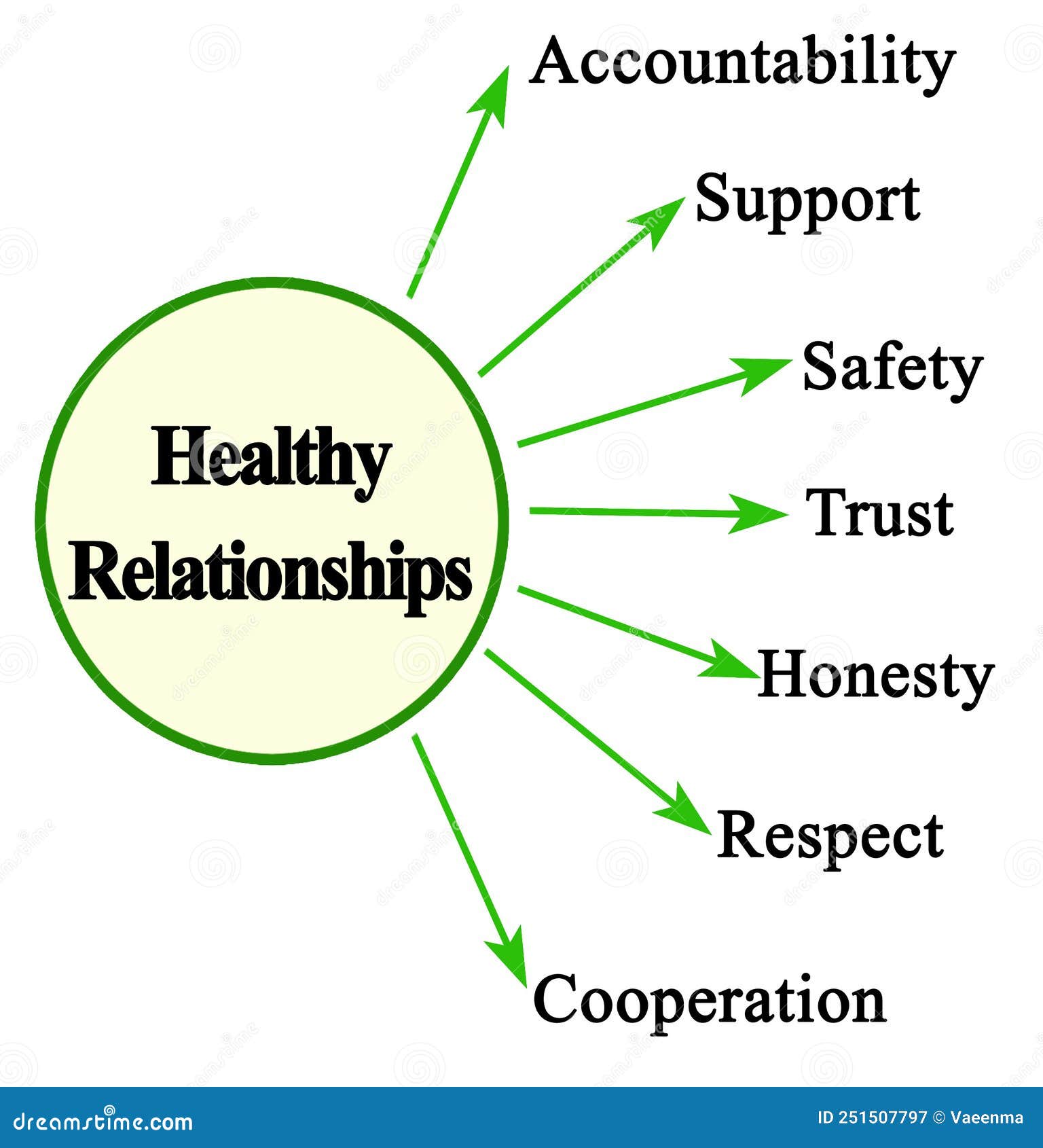
“Healthy Relationships Stock …” from www.dreamstime.com and used with no modifications.
Hindering Personal Growth
Egocentrism can also hinder personal growth by limiting your ability to learn from others and embrace new perspectives. When you’re overly focused on your own viewpoint, you may miss out on valuable insights and opportunities for development.
Creating Communication Barriers
Communication is a cornerstone of effective interaction, but egocentric behavior can create barriers in this area. By prioritizing your own thoughts and opinions, you may inadvertently stifle open dialogue and hinder meaningful exchanges.
To improve communication, strive to engage with others’ perspectives and encourage open, two-way conversations.
Limiting Teamwork and Collaboration
In a team setting, egocentric behavior can limit collaboration and hinder progress. When individuals focus solely on their own contributions, it can create an environment of competition rather than cooperation. This can ultimately impede the team’s ability to achieve shared goals.
To foster a collaborative atmosphere, emphasize the importance of collective success and value each team member’s input. Cultivating an adaptable mindset can further enhance teamwork and ensure that everyone feels valued and heard.
Strategies for Reducing Egocentric Behavior
Reducing egocentric behavior requires conscious effort and a commitment to personal growth. By adopting specific strategies, such as boosting proactivity, you can cultivate a more balanced approach to interactions and enhance your relationships.
Let’s explore some practical steps you can take to minimize egocentric tendencies and foster a healthier sense of self.
Practicing Active Listening
Active listening is a powerful tool in reducing egocentric behavior. It involves fully focusing on the speaker, understanding their message, and responding thoughtfully. By practicing active listening, you show respect for others’ perspectives and foster more meaningful conversations.
Start by maintaining eye contact and giving your full attention to the speaker. Avoid interrupting, and instead, nod or provide verbal affirmations to show you’re engaged. After they’ve finished speaking, summarize what they’ve said to ensure you’ve understood correctly. This not only enhances communication but also builds trust and rapport. For more insights on the importance of effective communication, consider exploring the costs of a big ego and its impact on relationships.
Developing Empathy
Empathy is the ability to understand and share the feelings of others. Developing empathy can significantly reduce egocentric tendencies by shifting the focus from yourself to those around you. To cultivate empathy, practice putting yourself in others’ shoes and considering how they might feel in a given situation.
Engage in conversations with the intent to learn about the other person’s experiences and emotions. Ask open-ended questions and listen without judgment. Over time, this practice will help you become more attuned to the needs and feelings of those around you.
Seeking Constructive Feedback
Receiving feedback can be challenging, especially for those with egocentric tendencies. However, seeking constructive feedback is crucial for personal growth and reducing self-centered behavior. By welcoming input from others, you open yourself up to new perspectives and opportunities for improvement.
Approach feedback with an open mind and a willingness to learn. Instead of becoming defensive, ask clarifying questions to better understand the feedback. Use this information to make positive changes and enhance your interactions with others.
Engaging in Self-Reflection and Mindfulness
- Set aside time each day for self-reflection. Consider your interactions and how you can improve.
- Practice mindfulness to become more aware of your thoughts and actions in the present moment.
- Keep a journal to track your progress and identify patterns in your behavior.
Self-reflection and mindfulness are powerful tools for reducing egocentric behavior. By taking time to reflect on your actions and thoughts, you can gain insight into how your behavior affects others. This awareness allows you to make more conscious choices and foster healthier relationships.
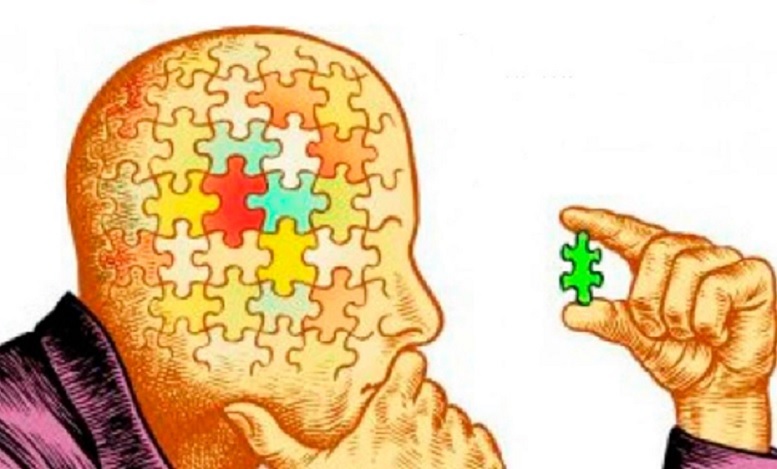
“Self-Reflection: Moving Beyond “I Yam …” from www.peoplethink.biz and used with no modifications.
Mindfulness, in particular, helps you stay present and focused on the here and now. It encourages you to let go of self-centered thoughts and connect more deeply with the world around you. Through regular practice, you can develop greater self-awareness and empathy.
Frequently Asked Questions (FAQ)
Understanding egocentric behavior can raise several questions. Let’s address some common queries to provide further clarity on this topic.
What are the signs of egocentric behavior in a relationship?
Signs of egocentric behavior in a relationship may include consistently prioritizing one’s own needs over the partner’s, lack of empathy, and difficulty considering the partner’s perspective. These behaviors can lead to feelings of neglect and emotional distance.
How can egocentric behavior be identified in communication?
Egocentric behavior in communication often manifests as interrupting others, dominating conversations, and focusing solely on one’s own thoughts and opinions. This can result in one-sided interactions where the listener feels unheard and undervalued.
To identify egocentric tendencies, pay attention to how much you speak versus listen in conversations and whether you acknowledge others’ contributions. For more insights on improving communication and relationships, explore these science-backed tips for healthy relationship goals.
How does a healthy ego benefit personal development?
A healthy ego can significantly benefit personal development by boosting self-confidence, providing motivation, and enhancing emotional resilience. It allows individuals to trust in their abilities, set ambitious goals, and persevere through challenges.
By maintaining a balanced ego, you can cultivate a strong sense of self that supports growth and success in various aspects of life.
What strategies can one use to become less egocentric?
- Practice active listening and engage with others’ perspectives.
- Develop empathy by considering others’ feelings and experiences.
- Seek constructive feedback to gain new insights and improve.
- Engage in self-reflection and mindfulness to increase self-awareness.
These strategies can help reduce egocentric behavior by encouraging a more balanced and empathetic approach to interactions.
By implementing these practices, you can foster healthier relationships and personal growth.
How is egocentrism different from narcissism?
While egocentrism and narcissism share some similarities, they are distinct concepts. Egocentrism involves difficulty seeing beyond one’s own perspective, often unintentionally. In contrast, narcissism is characterized by an inflated sense of self-importance and a need for admiration.
Narcissism is typically more pervasive and can include traits such as arrogance and a lack of empathy. Understanding these differences is crucial for addressing and improving behavior effectively.
Recognizing the nuances between egocentrism and narcissism allows for more targeted strategies in personal development and relationship building.








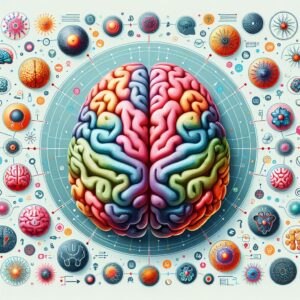

Leave a Reply